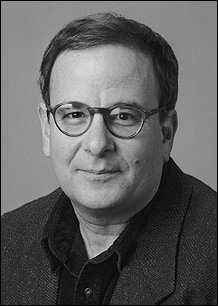![]()
Departments
![]()

|
Week of 2 October 1998 |
Vol. II, No. 8 |
Feature
Article
Tolerance, if not acceptance
New project draws religious tolerance from within tradition
|
Oh, the Protestants hate the Catholics And the Catholics hate the Protestants And the Hindus hate the Moslems And everybody hates the Jews. -- From Tom Lehrer's satirical song "National Brotherhood Week" |
Adam Seligman is familiar with the story of the American politician observing the intractable relations between the Jews and the Muslim Arabs in preindependence Israel who saw a simple path toward peace: the solution, the American said, was that the Jews and Arabs should behave more like Christians.
Seligman, an associate professor in the CAS department of religion and a research associate at BU's Institute for the Study of Economic Culture, laughs heartily when reminded of the anecdote. But he knows that the reemergence of strong religious identities around the world in the past decade or so has brought with it a new generation of religious intolerance. And not just toward other religions. "Let's remember that both sides participating in the slaughter in Rwanda were Catholics," he says, citing one sober example.
The answer to combating the potential enmity, he says, lies within each religion itself. Seligman's agent for this is the Toleration Project.
"I started the project about a year ago with an exploratory meeting in Berlin," he says. "I wanted Christians, Jews, and Moslems to talk together -- not for touchy-feely interfaith dialogue -- but so that the members of each group could isolate, within their traditions, those analytic components that can help reframe a new attitude toward the other."
Most of the 12 participants at the Berlin meeting were academics, but Seligman would like to get more people from the public policy sphere involved. "The idea was to get people who were familiar enough with their traditions to be able to speak with some degree of authority, and who also have a leg -- and a substantial leg -- in the modern world. It's not always that easy."
The project's follow-up conference is scheduled for Vienna next April. "We will add people from Turkey, Bosnia, and Israel," he says. "I've been encouraging the participants to write not for an academic audience, but a general one, and I'd like to have the material translated into Turkish, say, or Croatian, or Hebrew for dissemination. If there are enough participants with what I feel is good chemistry, I'd like to have a video of discussions distributed to U.S. consular libraries or possibly for broadcast."
|
|
|
Adam Seligman:
wants to meet with the ayatollahs. Photo by Kalman Zabarsky
|
Finding sources for toleration from within one's own religion is what makes Seligman's approach different from many others, says the author of books on sociology, the history of ideas, and moral philosophy, including The Problem of Trust, published last year. There is also the problem of intolerance between different groups within the same religion. He mentions the widening canyon in Israel not between Jews and Arabs but between religious and secular Jews. "How do we teach the rabbis democracy?" he asks. "Not by having them read John Locke." Seligman cites a Talmudic commentary about kingship in Israel, explaining that many religious Jews see the coronation of a king as being related to redemption and the coming of the messiah. "According to [the commentary], though, kingship in Israel is no different than it is for gentiles," he says. "It is just to solve the Hobbesian problems of order. It is a political issue, not a religious one. So there are sources and resources to solve a very severe problem in Israel today. You can't argue John Locke with the rabbis; you can argue [Talmudic sources]."
Of course, conferences of well-intentioned do-gooders convene all the time, the BU Bridge points out. Isn't the Toleration Project another example of preaching to the converted, to those who least need to hear the message?
"For the moment, yes, it is for the converted," Seligman acknowledges. "But the opposite of the converted are the ayatollahs, and most people fall in between the two poles. We can't convert the ayatollahs yet. There's a big place in the middle that can go either way, and it's precisely these people whom I want to influence, those who could well return to a fundamentalist, simplistic attitude toward religion.
"I also hope that once this gets started and continues and grows," he says, "we'll reach a point where we can have a conference with the ayatollahs."
